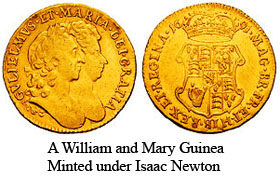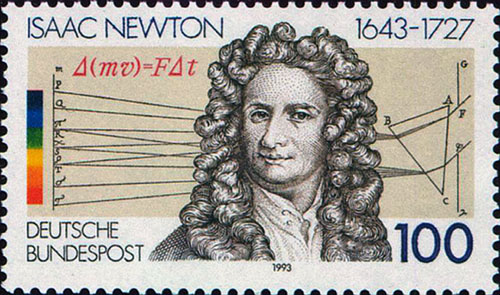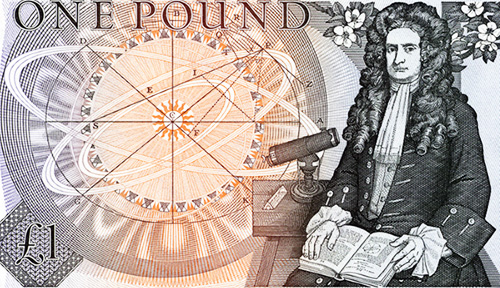Newton and the Mint
Today, Isaac Newton coins money. The University of Houston's College of Engineering presents this series about the machines that make our civilization run, and the people whose ingenuity created them.
Newton is a trouble to my mind. I've just finished another biography -- Peter Ackroyd's delightful little book titled Newton. Ackroyd treats Newton's excesses with disorienting objective respect. Yes, he was petty, vindictive, unforgiving of criticism, obsessive, and strung to the snapping point. But genius is meaningless without focus, and Newton's focus was legendary.
By the age of 51, he'd written the laws of motion, explained orbital mechanics, diagnosed light and color, and co-invented the calculus. On the side, he'd also worked tirelessly in alchemy. Ackroyd suggests that it took his alchemist's mind to formulate gravity as a force without substance and beyond explanation.
Then Newton underwent an 18-month mental breakdown marked by rages, sleeplessness, ranting letters ... He recovered from the worst of it, but he'd suffered a major burnout. His scientific drive had gone stale. Then the Crown began consulting him on economics and currency. British coinage was, it seems, in shambles.
Counterfeiting and coin shaving had been blatant for a long time. The silver content of coins was badly regulated. The situation was a mess and Newton was among those calling for a recall of all old coins and for minting of completely new coinage.
In 1696, Newton was offered the post of Warden of the Mint. It was supposed to be a cushy sinecure, but it took him away from bucolic Cambridge and hurled him into the teeming social world of London. No one, certainly not the lazy Master of the Mint, realized that no post would be a sinecure with Newton occupying it.
 Newton tore into the job. He reorganized the Mint, bought new equipment, and used his alchemical knowledge of metallurgy. He brought order out of chaos. The Master of the Mint died after three years, and Newton got his job. As the ruler of Britain's revised currency he instituted the shift to a gold standard. The shilling, pound, and pence were redefined so that twenty-one shillings and six pence would stay equivalent to one gold guinea.
Newton tore into the job. He reorganized the Mint, bought new equipment, and used his alchemical knowledge of metallurgy. He brought order out of chaos. The Master of the Mint died after three years, and Newton got his job. As the ruler of Britain's revised currency he instituted the shift to a gold standard. The shilling, pound, and pence were redefined so that twenty-one shillings and six pence would stay equivalent to one gold guinea.
Newton also became a detective, hunting down counterfeiters. He enforced the neglected death-by-hanging-drawing-and-quartering penalty. He could be found in taverns and the halls of Newgate prison searching for leads. The flip side of this life was that Newton changed from an isolated academic, wrapped in a brown study, to a wealthy London social figure. He re-invented himself as well as England's monetary system.
Yet, up to his death at 84, he never stopped trying to crush all opposition. I said that I'm troubled by Newton -- so effective in all he set out to do. It's easy to assume that his effectiveness sprang from his ruthlessness. It did not: Newton also brought intense focus to bear on everything he did. We need to remember that focus, not ruthlessness, was the alchemy of his astonishing abilities -- as it can be the alchemy of ours as well.
I'm John Lienhard at the University of Houston, where we're interested in the way inventive minds work.
P. Ackroyd, Newton. (New York: Nan A. Talese, Doubleday, 2006).
See also the Wikipedia articles on Isaac Newton and the guinea.

A German stamp honoring Newton singles out his work on optics and includes a mathematical statement of his Second Law of Motion.

The Master of the Mint honored by the Mint, almost three centuries later.